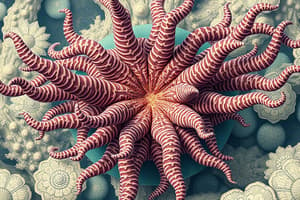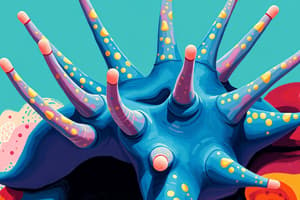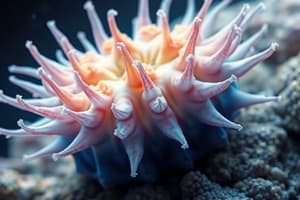Podcast
Questions and Answers
Which of the following are characteristics of Echinodermata? (Select all that apply)
Which of the following are characteristics of Echinodermata? (Select all that apply)
- Deuterostomes (correct)
- Five-part body plan (correct)
- Radially symmetrical adult bodies (correct)
- Exclusively terrestrial
What are ossicles?
What are ossicles?
Calcareous plates that make up an Echinoderm's internal skeleton.
Who is in phylum Echinodermata?
Who is in phylum Echinodermata?
Sea stars, sea urchins, sand dollars, and sea cucumbers.
What are the characteristics of Protostomes?
What are the characteristics of Protostomes?
What are the characteristics of Deuterostomes?
What are the characteristics of Deuterostomes?
How many species of Echinoderms are there?
How many species of Echinoderms are there?
What does the word Echinoderm mean?
What does the word Echinoderm mean?
How are the five classes of Echinoderms primarily distinguished?
How are the five classes of Echinoderms primarily distinguished?
What are dermal gills?
What are dermal gills?
What are pedicellariae?
What are pedicellariae?
What is the madreporite?
What is the madreporite?
What is the ambulacral groove?
What is the ambulacral groove?
What is the ambulacral ridge?
What is the ambulacral ridge?
What organisms are in class Asteroidea?
What organisms are in class Asteroidea?
What is the external anatomy of a sea star on the oral and aboral surface?
What is the external anatomy of a sea star on the oral and aboral surface?
What is the arrangement of the ossicles in class Asteroidea?
What is the arrangement of the ossicles in class Asteroidea?
What are the characteristics of spines in class Asteroidea?
What are the characteristics of spines in class Asteroidea?
What can you see in the oral view of a sea star?
What can you see in the oral view of a sea star?
What can you see in the aboral view of a sea star?
What can you see in the aboral view of a sea star?
What type of symmetry does the bipinnaria larval stage of a starfish demonstrate?
What type of symmetry does the bipinnaria larval stage of a starfish demonstrate?
Who is in class Ophiuroidea?
Who is in class Ophiuroidea?
Who is in class Crinoidea?
Who is in class Crinoidea?
What are the defining characteristics of class Ophiuroidea?
What are the defining characteristics of class Ophiuroidea?
What are the defining characteristics of class Crinoidea?
What are the defining characteristics of class Crinoidea?
Do the ossicles in brittle stars overlap?
Do the ossicles in brittle stars overlap?
Are the tube feet visible in the Ophioderma?
Are the tube feet visible in the Ophioderma?
How does the position of the mouth and anus of a crinoid relate to a primitive sessile existence?
How does the position of the mouth and anus of a crinoid relate to a primitive sessile existence?
Who is in class Echinoidea?
Who is in class Echinoidea?
What are the defining characteristics of sea urchins?
What are the defining characteristics of sea urchins?
What is a test?
What is a test?
Flashcards are hidden until you start studying
Study Notes
Characteristics of Echinodermata
- Deuterostomes characterized by radial symmetry in adults.
- Have calcareous ossicles, forming part of their internal skeleton.
- Exhibit a five-part body plan and a unique water vascular system.
- Possess tube feet used for locomotion and feeding.
- Capable of regeneration and primarily marine dwellers.
- Approximately 6000 species are classified under this phylum.
Definitions and Key Terms
- Ossicles: Calcareous plates making up the internal skeleton of echinoderms.
- Echinoderm: Derived from Greek; "echino" means spiny and "derm" means skin.
- Madreporite: A crucial opening that filters water into the echinoderm's water vascular system.
- Ambulacral groove: A channel along the oral surface where tube feet extend.
- Pedicellariae: Tiny pincers on sea stars and some sea urchins that maintain body cleanliness.
- Dermal gills: Projections aiding in respiration and excretion through diffusion.
Classes within Echinodermata
- Asteroidea (Sea Stars): Characterized by a loosely arranged ossicle structure under the skin, small blunt spines, and visible tube feet on the oral surface. The aboral view features arms, anus, and madreporite.
- Ophiuroidea (Brittle Stars): Defined by slender arms distinct from the central disk, thick ossicles, and rapid crawling movement. They mainly feed on suspended food particles.
- Crinoidea (Sea Lilies and Feather Stars): Oldest class with upward-facing oral surface, well-developed ossicles, and feathery arms for filter feeding.
- Echinoidea (Sea Urchins and Sand Dollars): Lack distinct arms, possessing a solid test of fused ossicles with movable spines and tube feet for locomotion.
Unique Features
- The bipinnaria larval stage of starfish exhibits bilateral symmetry, a contrasting characteristic to adult forms.
- The oral position of crinoids retains a primitive upward orientation indicating a sessile existence, enhancing filter feeding capacity.
- Ossicles in brittle stars are not overlapping, differing from other classes.
Echinoderm Anatomy
- Understanding sea star anatomy includes recognizing structures such as the digestive gland, gonad, radial canal, madreporite, and stomach.
- Tube feet and ambulacral grooves are essential for movement and feeding in echinoderms, facilitating interaction with their environment.
Evolutionary Significance
- The evolutionary significance of the water vascular system and regenerative capabilities in echinoderms reflects their adaptation to marine ecosystems and interactions.
Studying That Suits You
Use AI to generate personalized quizzes and flashcards to suit your learning preferences.




